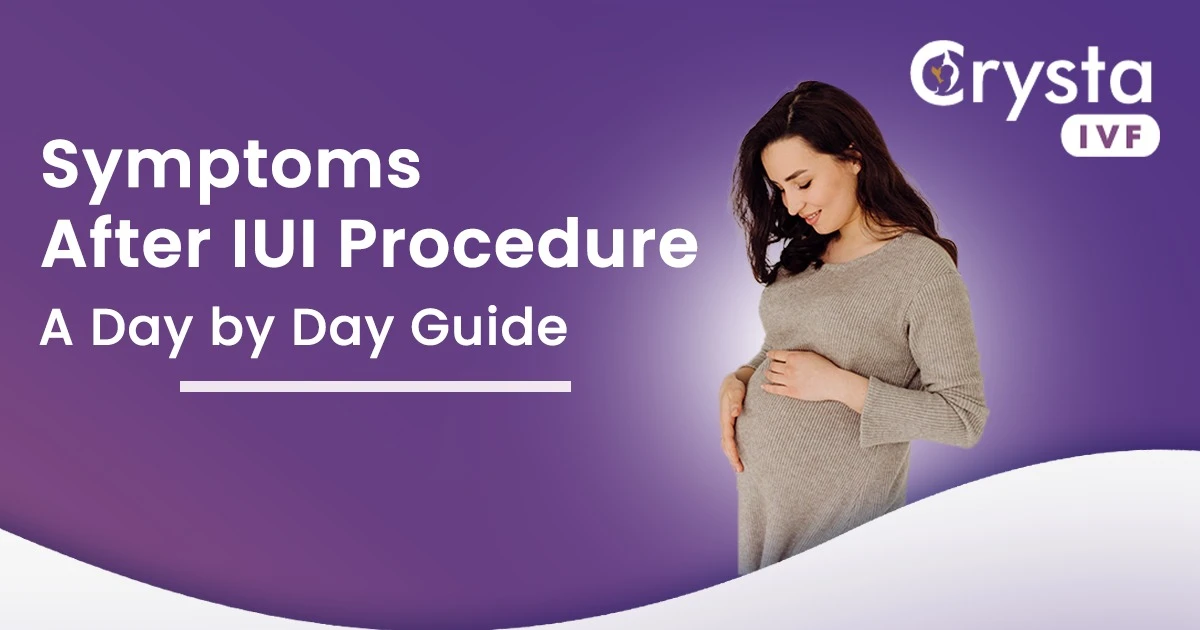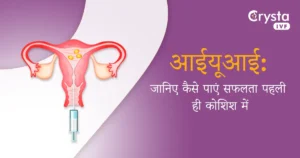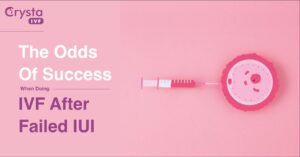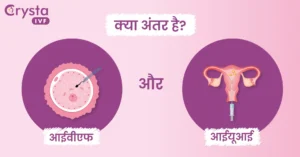IUI is the fertility treatment that gives hope to many couples looking to conceive. During the IUI procedure, the sperm is injected into the uterus, thus increasing the chances of fertilization. The process is simple, but after the IUI phase, it can cause various symptoms.
As soon as the sperm is injected, experts ask to take the pregnancy test. After the procedure, your body will experience many changes and symptoms. This guide will help you to understand what your body experiences and what symptoms you will go through after IUI procedure. Let’s get started!
IUI Symptoms After IUI day by day
The fertility journey can be emotionally challenging. After the procedure, you might experience various emotions, from hope and excitement to anxiety and frustration. Let’s explore the common symptoms day by day-
1 Day after IUI: Symptoms
The sperm is injected into the uterus via the cervix to increase the chances of fertilization. You might feel slight cramps or spotting. Light spotting can occur due to cervical irritation from the catheter.
3 Days after IUI: Symptoms
Mild cramping, bloating, or spotting may persist. Avoid heavy lifting, strenuous exercise, and sexual activity.
6-10 days after IUI: Symptoms
As you move past the 10 days, early pregnancy symptoms like fatigue, nausea, and food intolerance might start to appear, but it is best to wait at least 14 days after IUI for a reliable pregnancy test. Here are the symptoms-
- Cramping- You might feel period cramps because the fertilized egg implants itself in the uterine lining.
- Implantation bleeding- Some women might notice light bleeding around the time of implantation. Don’t confuse this with period.
- Breast tenderness- Hormonal fluctuations can cause breast tenderness, similar to what you might experience before your period.
- Bloating- Hormonal changes may cause bloating, so don’t be surprised if your clothes feel a bit snugger.
- Basal Body Temperature (BBT) changes- You might see a rise after ovulation, which could be a sign of implantation.
14 days After IUI symptoms
- Fatigue- Due to hormone changes like progesterone, feeling tired all the time is one of the most common signs of pregnancy after IUI.
- Morning sickness- Nausea and vomiting symptoms are signs of early pregnancy and may continue till the entire pregnancy.
- Food intolerance- Hormonal changes can make you more sensitive to smell during pregnancy.
- Spotting- Light spotting can occur at the time of implantation.
- Missed period- Missing periods confirm the pregnancy, which means the embryos were successfully implanted.
- Frequent Urination- The growing uterus can put pressure on the gallbladder, which can lead to more frequent bathroom trips.
- Changes in vaginal Discharge- Increased discharge, sometimes thicker or stickier, is a common early pregnancy sign.
After IUI: How to Confirm Pregnancy?
There are two main ways to confirm pregnancy after IUI. Either you can take a pregnancy test at home or can take a blood test.
- Home pregnancy test- This is one of the most common and convenient options. However, for the most accurate results. To test. You take this test after 14 days of IUI procedure.
- Blood test- You can choose a blood test for pregnancy to confirm pregnancy if you test. Early detection allows us to detect hCG levels accurately from home pregnancy tests. Blood tests measure the exact amount of hCG present, which can be helpful for monitoring the progress of a pregnancy.
What are the symptoms of failed IUI?
Well, there are no accurate symptoms of failed IUI. This can be frustrating during the two-week wait after the IUI. Here are some symptoms-
- Similar symptoms to pregnancy- The symptoms are similar to early pregnancy symptoms, like fatigue, cramping, and breast tenderness, nausea, which may occur during the luteal phase (second half) of your menstrual cycle, even if you’re not pregnant.
- Absence of symptoms doesn’t mean failure- Some women might not experience any noticeable symptoms during early pregnancy, but this does not confirm a failed IUI cycle.
However, there are some signs that might signify IUI wasn’t successful:
- Menstrual cycle- Periods around or expected time is a strong sign of unsuccessful IUI procedure.
- Negative pregnancy test- A negative home pregnancy test at least 14 days after IUI means the procedure was unsuccessful. However, before coming to any conclusion, consult your doctor and get tested appropriately.
A failed IUI cycle doesn’t mean you can’t conceive in the future. There are many factors that influence the success rates of IUI. Discuss your experience with your doctors.
Tips for Managing IUI Symptoms
To manage IUI symptoms, there are some tips mentioned below-
- Listen to your body- Don’t overstress your body; if you experience any abnormal symptoms, take it easy and prioritize rest.
- Focus on light exercises- Avoid strenuous exercise, but gentle walks or yoga can help manage discomfort and improve overall health.
- Yoga and meditation- Try relaxation techniques like yoga, deep breathing, and meditation to improve flexibility and circulation.
- Maintain a healthy lifestyle- Take a balanced diet rich in essential vitamins and minerals. Stay hydrated, and get enough sleep.
Don’t bottle up your emotions. Talk to your partner and your doctor about your emotions.
When to seek help?
Waiting for pregnancy confirmation is the hardest part of the IUI process. It is very common to experience a mixture of emotion and anxiety waiting for the first pregnancy test. Keeping a record of your symptoms can be helpful for you and your doctor. Note the timing, intensity, and any other relevant details. Eat nutritious foods, get enough sleep, and stay hydrated.
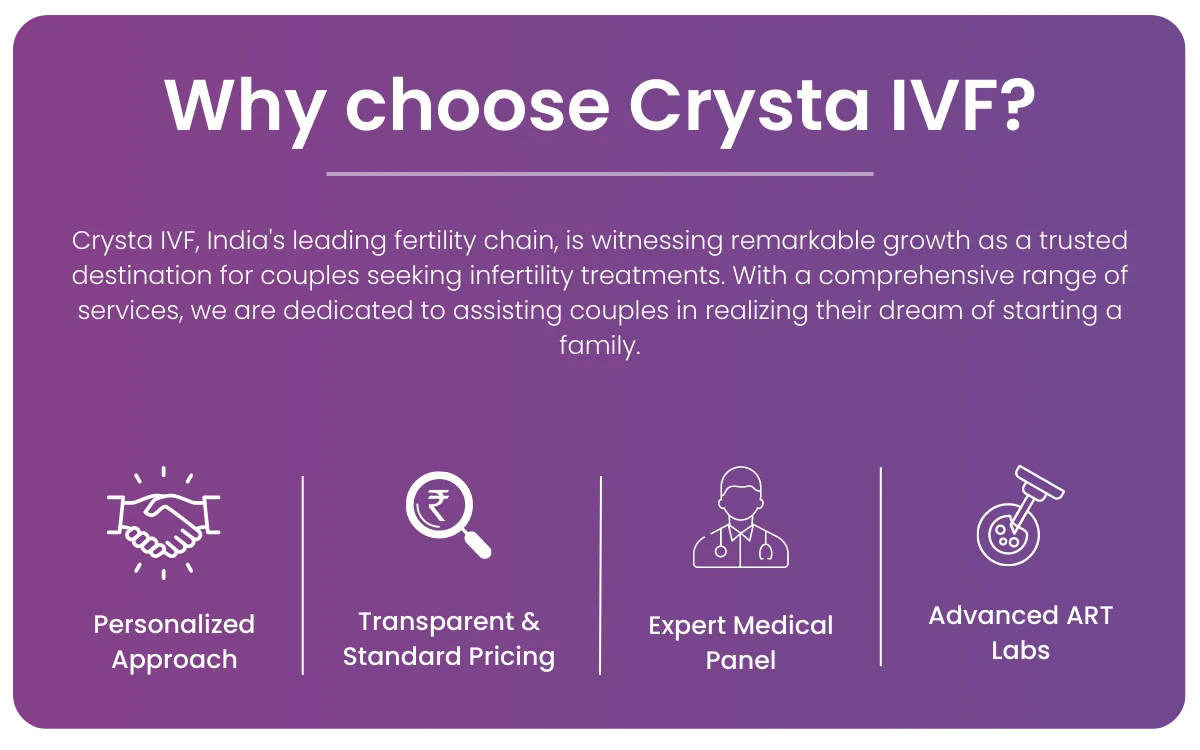
Note that every woman’s body is different, and not everyone experiences the same symptoms. So don’t worry if you don’t notice the above-mentioned symptoms. A lack of symptoms does not mean IUI was successful. If you have any concerns, don’t hesitate to reach out to your doctor for guidance and support during this exciting time!

Medically Reviewed By
Dr. Puja Kumari


